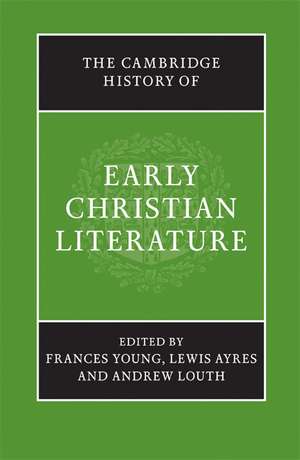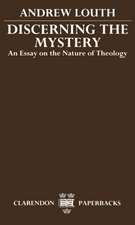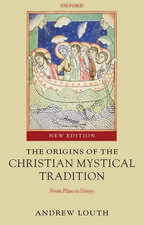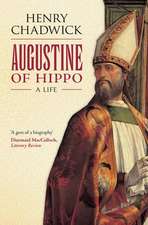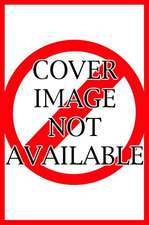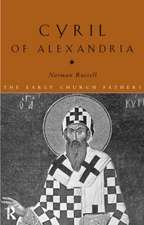The Cambridge History of Early Christian Literature
Editat de Frances Young, Lewis Ayres, Andrew Louth Augustine Casidayen Limba Engleză Paperback – 5 sep 2007
| Toate formatele și edițiile | Preț | Express |
|---|---|---|
| Paperback (1) | 428.83 lei 43-57 zile | |
| Cambridge University Press – 5 sep 2007 | 428.83 lei 43-57 zile | |
| Hardback (1) | 1268.05 lei 22-36 zile | |
| Cambridge University Press – 31 mar 2004 | 1268.05 lei 22-36 zile |
Preț: 428.83 lei
Nou
Puncte Express: 643
Preț estimativ în valută:
82.06€ • 85.89$ • 68.30£
82.06€ • 85.89$ • 68.30£
Carte tipărită la comandă
Livrare economică 31 martie-14 aprilie
Preluare comenzi: 021 569.72.76
Specificații
ISBN-13: 9780521697507
ISBN-10: 0521697506
Pagini: 568
Ilustrații: 1 map 1 table
Dimensiuni: 152 x 229 x 29 mm
Greutate: 0.9 kg
Editura: Cambridge University Press
Colecția Cambridge University Press
Locul publicării:Cambridge, United Kingdom
ISBN-10: 0521697506
Pagini: 568
Ilustrații: 1 map 1 table
Dimensiuni: 152 x 229 x 29 mm
Greutate: 0.9 kg
Editura: Cambridge University Press
Colecția Cambridge University Press
Locul publicării:Cambridge, United Kingdom
Cuprins
Part I. The Beginnings: The New Testament to Irenaeus: 1. Introduction: Christian literary genres and their second-century development Frances Young; 2. Apostolic and subapostolic writings: the New Testament and the Apostolic fathers R. A. Norris; 3. Gnostic literature R. A. Norris; 4. Apocryphal material: acts of the martyrs R. A. Norris; 5. Apologetic material: Melito and the Peri Pascha R. A. Norris; 6. Irenaeus R. A. Norris; 7. Social and historical setting John Behr; 8. Articulating identity R. A. Norris; 9. Christian teaching Frances Young; 10. Towards a hermeneutic of second-century texts Frances Young; Part II. The Third Century: 11. The Alexandrians Ronald E. Heine; 12. The beginnings of Latin Christian literature Ronald E. Heine; 13. Hippolytus, pseudo-Hippolytus and the early canons Ronald E. Heine; 14. Cyprian and Novatian Ronald E. Heine; 15. Syriac literature Sebastian Brock; 16. Concluding review: the literary culture of the third century Frances Young; 17. Social and historical setting: Christianity as culture critique Karen Jo Torjesen; 18. Articulating identity Ronald E. Heine; 19. Christian teaching David Dawson; 20. The significance of third-century Christian literature Frances Young; Part III. Foundations of a New Culture: From Diocletian to Cyril: 21. Classical genres in Christian guise: Christian genres in classical guise Frances Young; 22. Arnobius and Lactantius Oliver Nicholson; 23. Eusebius and the birth of Church history Andrew Louth; 24. Fourth-century Alexandrians: Athanasius and Didymus Andrew Louth; 25. Palastine: Cyril of Jerusalem and Epiphanius Andrew Louth; 26. The Cappadocians Andrew Louth; 27. Fourth-century Latin writers: Hilary, Victorinus, Ambrose, Ambrosiaster David G. Hunter; 28. Jerome and Rufinus Mark Vessey; 29. Augustine Henry Chadwick; 30. John Chrysostom and the antiochene school to Theodoret of Cyrrhus Andrew Louth; 31. Cyril of Alexandria Andrew Louth; 32. Hagiography Andrew Louth; 33. Ephrem and the Syriac tradition Sebastian Brock; 34. The literature of the monastic movement Andrew Louth; 35. Women and words: texts by and about women Susan Ashbrook Harvey; 36. Conciliar records and canons Andrew Louth; 37. Social and historical setting R. A. Markus; 38. Articulating identity Lewis Ayres; 39. Christian teaching Frances Young; 40. Retrospect: interpretation and appropriation Frances Young.
Recenzii
'In sum: this is a fine and important book, with excellent essays.' Church Times
'As no-one can keep abreast of every aspect of the discipline, this volume will be useful even to specialists who may not be fully aware of developments outside their immediate field of interest. … this is a most useful book which will be of great help to anyone who needs a guide to part or all of the period which it covers.' Evangelical Quarterly
'… the most exhaustive treatment of early Christian literature in quite some time, and is an indispensable reference work.' Religious Studies Review
'The Cambridge History of early Literature is a first-rate work of Scholarship. it will be a welcome addition to those handy reference shelves and may well bump some works that are already there to a lower place.' Scottish Journal of Theology
'There are three standard approaches to the study of ancient Christianity. One is historical, another is theological, and finally a third approach is literary. … The present Cambridge history masterfully integrates these three approaches into one volume, which its editors rightly hope will become 'a standard work of reference.' It is indeed a superb volume, which as its title indicates surveys early Christian literature from its beginnings up to the middle of the fifth century.' Gregorianum
'This volume will certainly stand both as a statement of the progress made so far in this field and as a prospectus for future …' Journal of Theological Studies
'As no-one can keep abreast of every aspect of the discipline, this volume will be useful even to specialists who may not be fully aware of developments outside their immediate field of interest. … this is a most useful book which will be of great help to anyone who needs a guide to part or all of the period which it covers.' Evangelical Quarterly
'… the most exhaustive treatment of early Christian literature in quite some time, and is an indispensable reference work.' Religious Studies Review
'The Cambridge History of early Literature is a first-rate work of Scholarship. it will be a welcome addition to those handy reference shelves and may well bump some works that are already there to a lower place.' Scottish Journal of Theology
'There are three standard approaches to the study of ancient Christianity. One is historical, another is theological, and finally a third approach is literary. … The present Cambridge history masterfully integrates these three approaches into one volume, which its editors rightly hope will become 'a standard work of reference.' It is indeed a superb volume, which as its title indicates surveys early Christian literature from its beginnings up to the middle of the fifth century.' Gregorianum
'This volume will certainly stand both as a statement of the progress made so far in this field and as a prospectus for future …' Journal of Theological Studies
Descriere
A systematic account of Christian literature in the period c.100–c 400.
